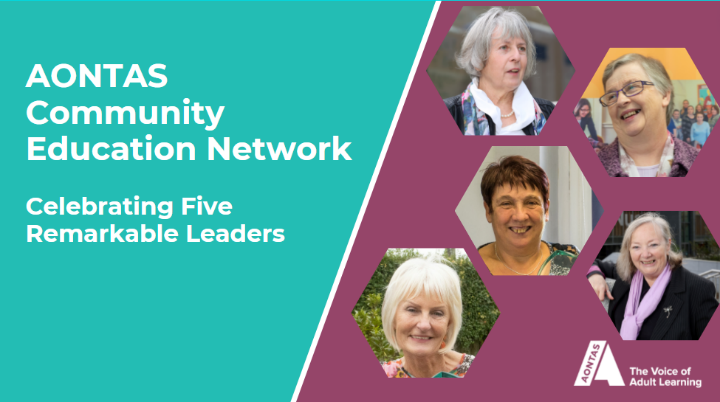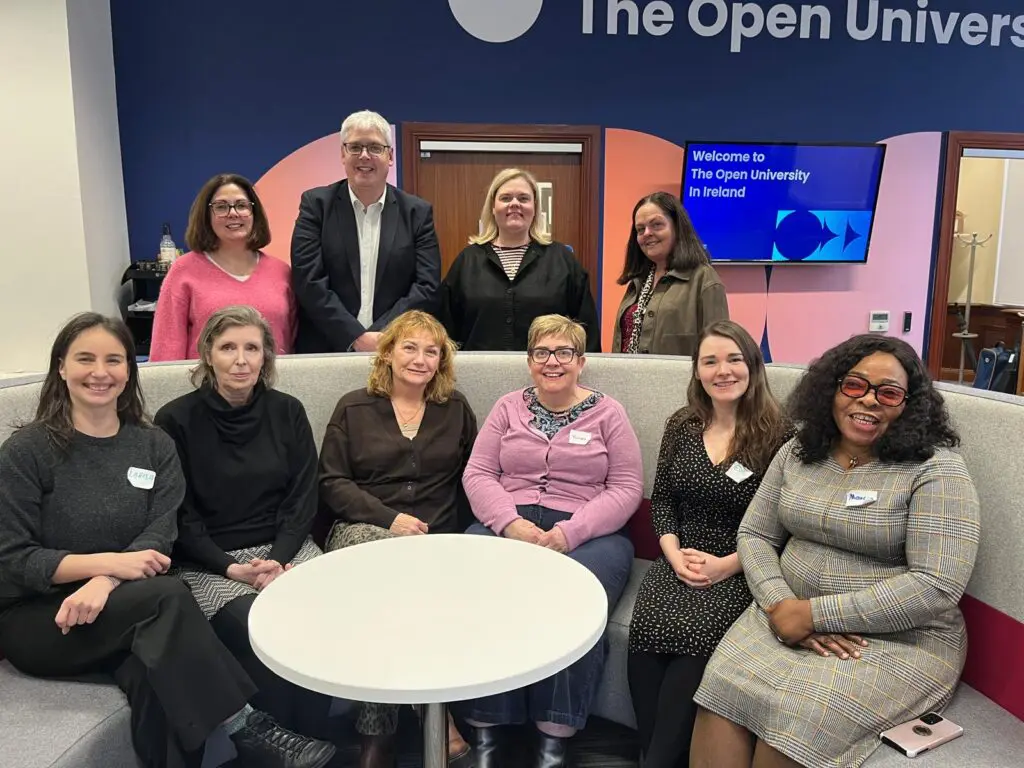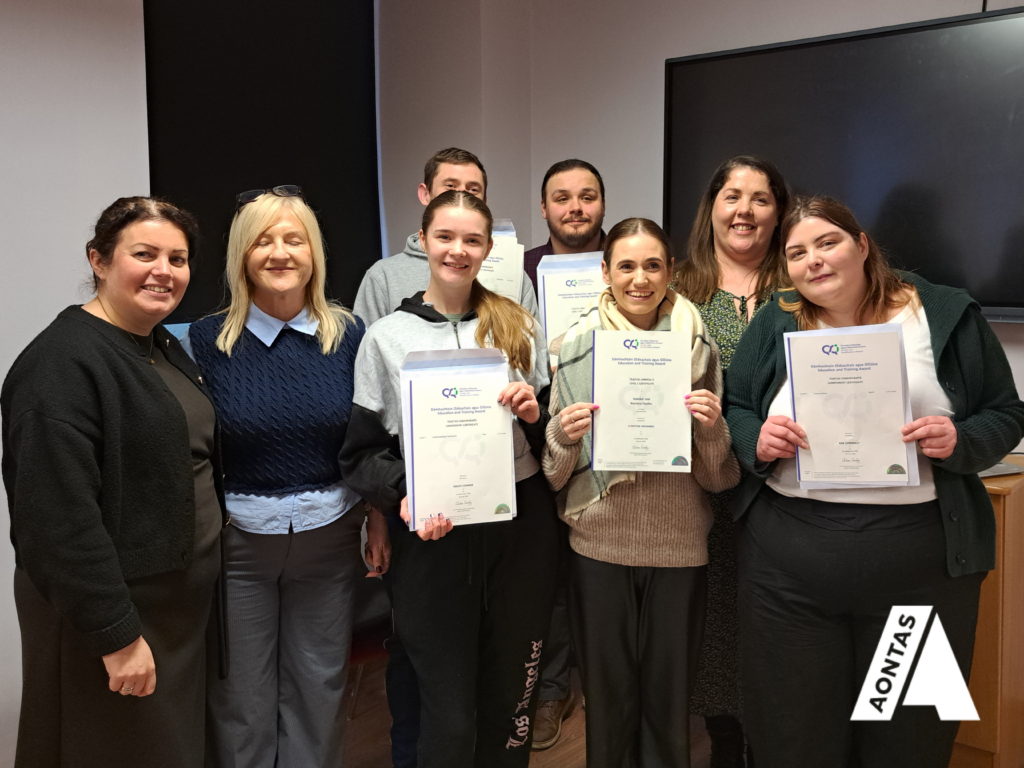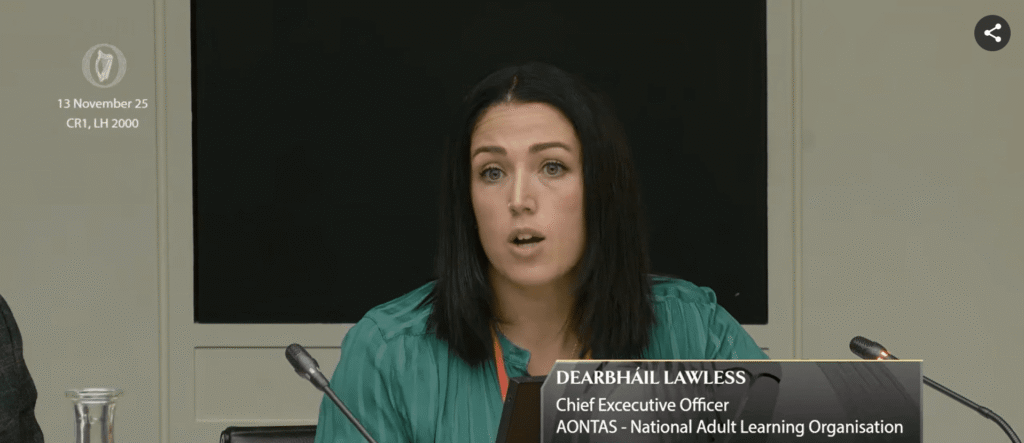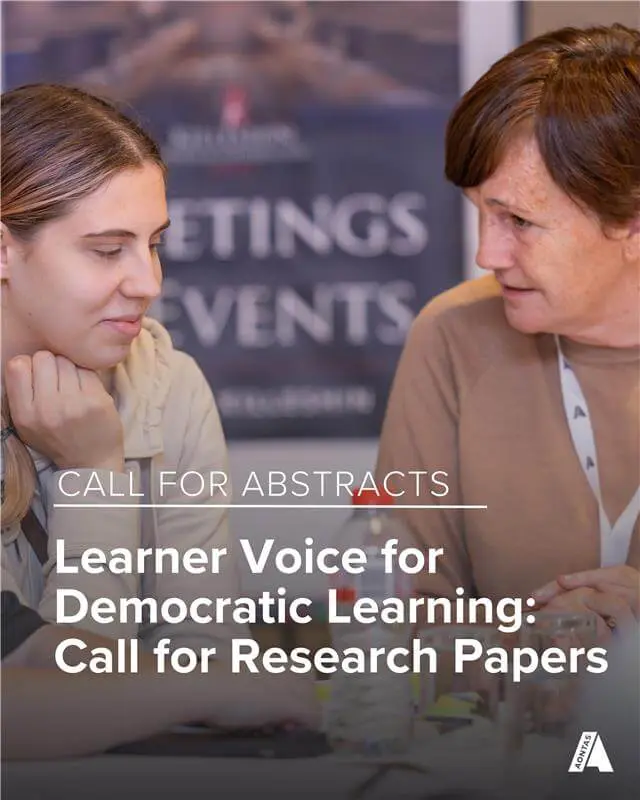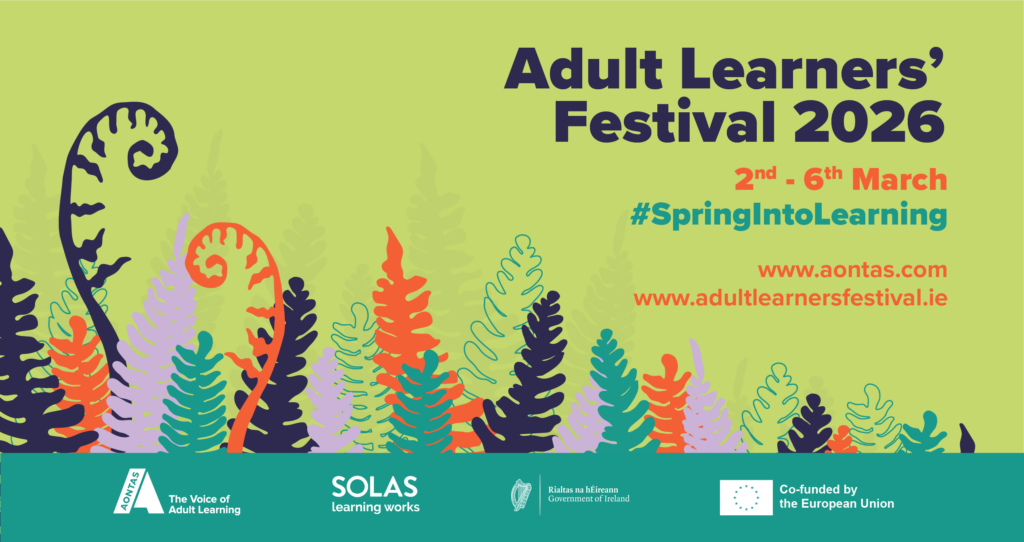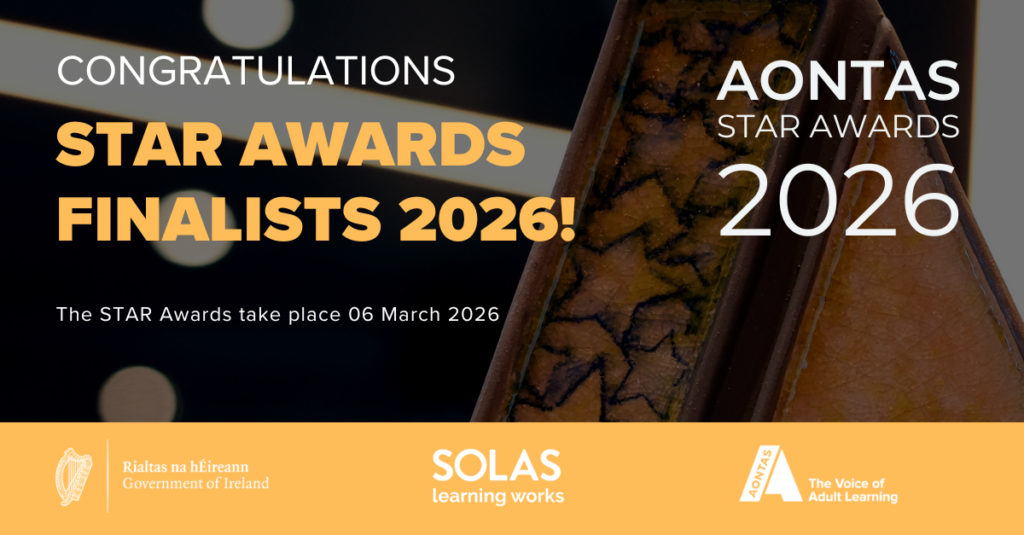The meeting also provided members with the opportunity to learn more about the impact of the Mitigating Against Educational Disadvantage (MAED) Fund, with inputs from Nessa White, Director of Transformation in SOLAS, and the practitioner perspective of Maura Kearney, Education Coordinator with the Acorn Project, Edenderry. The meeting concluded with an input from Frances Haworth, Head of Grants, Donor Care & Impact, the Community Foundation for Ireland, on funding opportunities and key tips and guidance for AONTAS CEN members when applying for funding.
The Celebration of Five Remarkable Retirees
“Community Education is more than just a job, it is something you become part of.” – Marian Donegan, Project Coordinator, Access 2000
AONTAS Senior Community Education Officer, Suzanne Kyle paid tribute at the beginning of the meeting to Bríd Connolly (Maynooth University), Catherine Aylmer (Limerick Community Education Network), Marian Donegan (Access 2000), Anne Flannery (The Larkin Centre) and Pauline McGaley (Warrenmount Community Education Centre), who have recently retired from community education, for their unwavering dedication, commitment and influence in the sector. These five women were also recently presented with AONTAS awards for their outstanding contribution to community education and the AONTAS CEN. The meeting provided an opportunity to showcase their remarkable achievements and grassroots work in shaping community education but also to acknowledge their special expertise and commitment they brought to the CEN, over many years. Niamh O’Reilly, AONTAS CEO acknowledged the significant contribution made by these women as leaders and innovators in community education. She spoke about succession and holding onto this sectoral knowledge when so much of it has been built by volunteers and largely by women. While there is a huge community of expertise there and within the CEN, clear professional career paths and sustainable multiannual funding are required to attract and retain community educators.
The Key Learnings from the Mitigating Against Educational Disadvantage Fund
Niamh O’Reilly, AONTAS CEO, introduced the session and thanked Nessa for taking the time to join the CEN meeting. Niamh acknowledged that, while the Mitigating Against Educational Disadvantage (MAED) Fund was a significant milestone in obtaining a new funding stream in what has been a particularly challenging time for the sector, a more sustainable and consistent funding stream is required for community education to survive as highlighted in the Community Education Network (CEN) Census report, “CEN Census 2020: Community Education in a time of COVID-19”.
Maura Kearney, Education Coordinator, Acorn Project, spoke about the impact of the MAED Fund on the Acorn project. Access to the fund allowed the Acorn project engage fourteen learners online that would otherwise have been unable to do so, and also had a wider benefit on the families of learners. One challenge that arose was the inability to cover staffing costs, which continue to be needed:
“The equipment is great but if we don’t have the staff to provide learners with personal development support to use the computers, this is challenging. We all know what it was like to ring learners every day to make sure they were okay and could log into the online class.” – Maura Kearney, Education Coordinator, Acorn Project
Nessa White, Director of Transformation, SOLAS, discussed the MAED Fund with members including how to came to be, the purpose of the fund and key learnings from the Fund going forward. CEN members were also provided with an opportunity to provide their own feedback. Nessa, described AONTAS representation on behalf of the community education sector as ‘relentless’ and welcomed the opportunity to discuss funding in a collaborative space such as this.
To learn more about the MAED Fund and how it evolved please click here.
Nessa acknowledged that, while MAED Fund was successful in helping to bridge the gap in educational equality by building capacity to address specific barriers such as the digital divide, we need to look beyond the technical provisions and consider the human element required to drive this e.g. the tutor/staff hours required to support learners accessing technology for the first time. The upcoming Community Education Framework is an opportunity to put in place structures that can increase access to more accessible and consistent supports for community education.
Nessa acknowledged that the while feedback about the MAED fund overall was very positive there is still room for improvement and consideration of how funding is provided going forward. These were discussed in the Q & A with AONTAS staff and CEN members and the key points are highlighted below:
- Accessibility of the application process – ensuring all community education centres are fully aware of the funding, have the resources and time to apply for it and there is a standardised approach across all ETBs
- The consideration of other barriers to learning such as travel costs, childcare and one to one support for learners
- The need for adequately resourced staff and tutors to sustain community education and to effectively support their learners and the additional challenges they face
If CEN members wish to provide any further feedback on the MAED Funding process please email Dearbháil Lawless, AONTAS Head of Advocacy: dlawless@aontas.com
Tips and Guidance when Applying for Community Funding
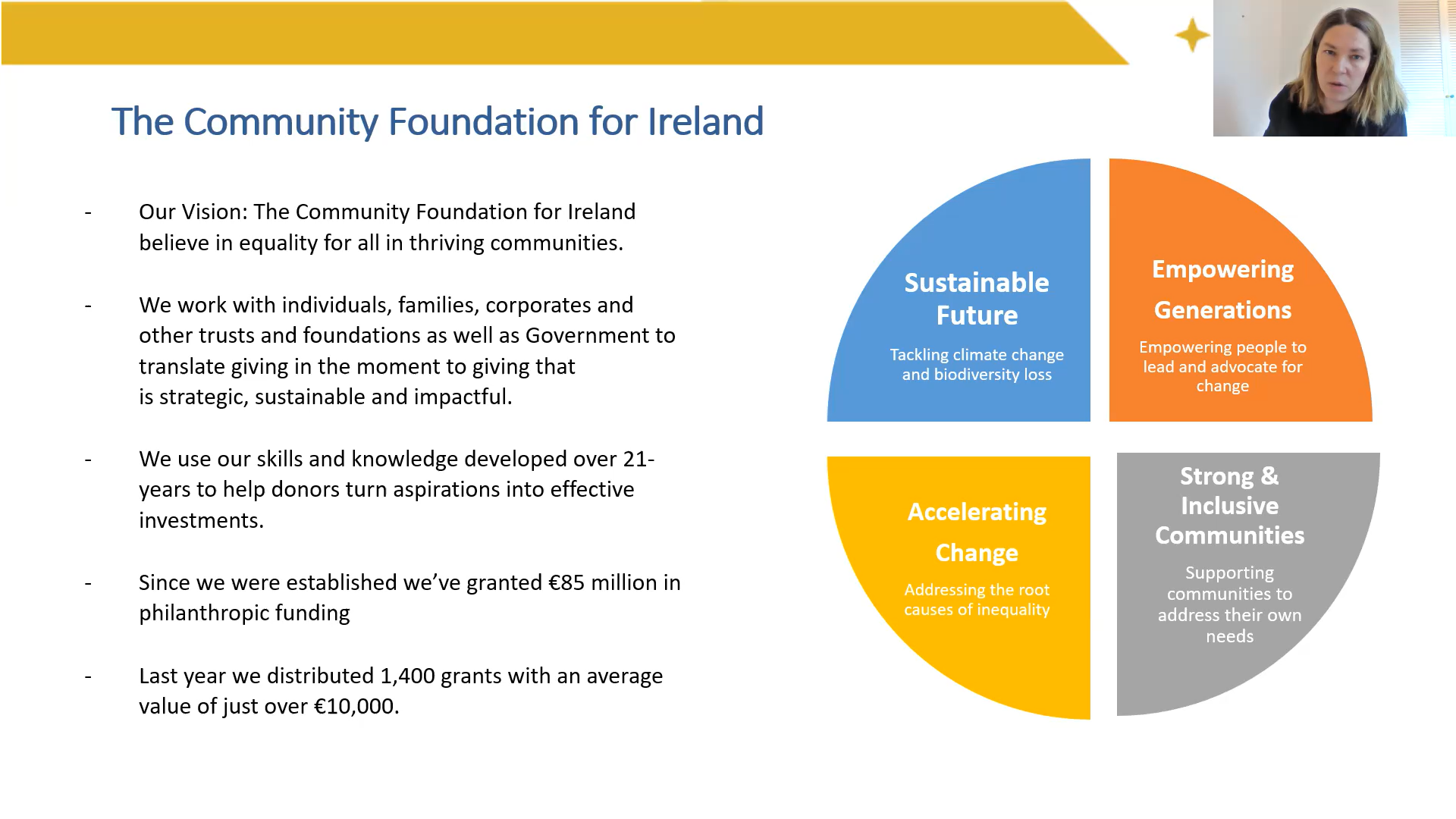
Frances Haworth, Head of Grants, Donor Care & Impact, the Community Foundation Ireland, joined the CEN to discuss the funding they have available and some key tips for members on best practice when completing funding applications. The Community Foundation for Ireland’s core belief is equality for all in communities and their work involves providing grants (acquired from charitable donations) to community organisations. Since there establishment they have invested over seventy-five million into communities.
For AONTAS CEN members, the Community Foundation for Ireland could be an avenue for funding in areas such as work with lone parents, elderly learners and women in the community. Frances shared some key tips when applying for funding as highlighted below:
- Provide a detailed funding proposal, clearly showing how the project or work will be carried out, how it meets the funding criteria and key timelines to achieve this
- Demonstrate why the project is needed using research and evidence and clearly outline the project impact and planned outcomes
- Develop a realistic budget, exact quotes are not necessarily required but it should be detailed and well thought out
- Demonstrate how the project can be sustained within the community i.e. show how it can carry on after the funding period ends (if relevant)
- Reach out for support from the funding organisation you are completing a funding application – remember they want you to succeed with your application
- Engage with key people involved in your project to ensure your application includes all the right voices
- Finally, remember you are the expert and know what is best when working with your target audience, use that knowledge to your advantage
For further information on applying for funding with the Community Foundation for Ireland please get in touch through their support hub here.
Key Questions Arising from CEN members:
- How can we best hold onto the knowledge we have gained from key people in the sector when they move on or step down from their roles?
- How can the MAED Funding process be adapted in the future to best suit the needs of community organisations?
Thank you to all our speakers for contributing to the CEN and sharing your expertise. Thank you to our members for attending the CEN and we look forward to an exciting year ahead in 2022 to provide new opportunities for collaboration and learning.
For more information on the AONTAS Community Education Network, or to become a member, please click here: https://www.aontas.com/community/community-education-network.
